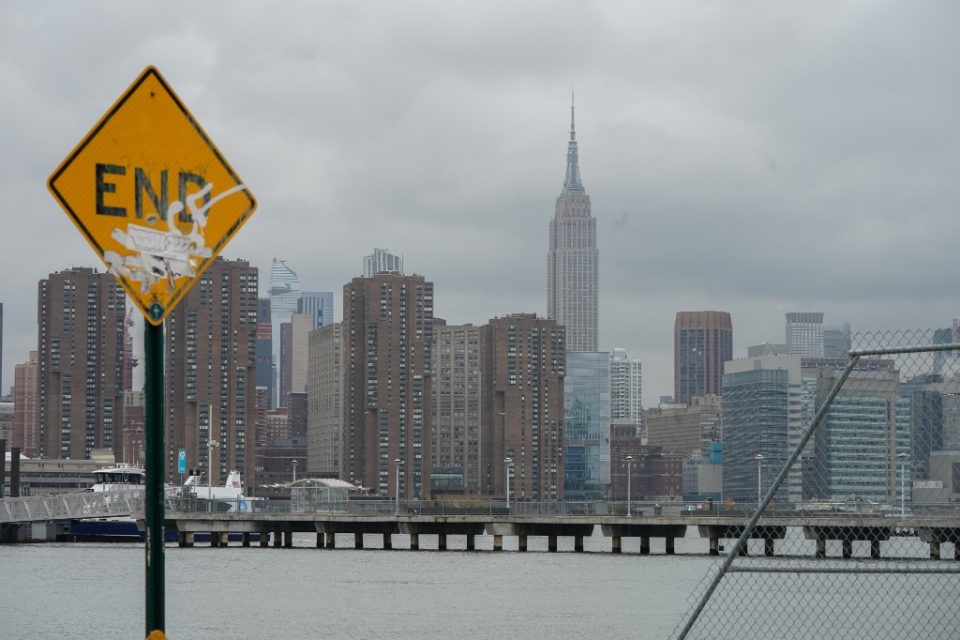
by Michael Mathes
WASHINGTON, United States (AFP) — Republican opposition to expanding certain unemployment benefits was delaying Senate passage Wednesday of the largest economic rescue package in modern US history, amid fears that New York could be the next epicenter of the coronavirus pandemic.
The United States now has over 65,000 confirmed cases, the third-highest number globally behind China and Italy. About half are in New York state.
“We still have the trajectory going up,” said New York Governor Andrew Cuomo, adding that about 12 percent of the people who test positive require hospitalization.
Cuomo said health officials anticipate about 120,000 coronavirus patients coming into New York’s hospitals, which have a capacity of 50,000 beds.
The state has around 30,000 confirmed cases, he added, with 285 deaths.
But the governor pointed to evidence suggesting New York’s strict stay-at-home orders and social distancing measures have slowed the hospitalization rate.
“The arrows are headed in the right direction,” Cuomo told reporters.
A congressional impasse, however, began to overshadow the deal reached overnight on the massive relief package.
Four Republican senators have balked at the generous provisions agreed to by Democratic and Republican congressional leaders and the White House after days of intense wrangling over the $2 trillion stimulus.
The package was expected to pass the chamber Wednesday and head to the House of Representatives and eventually President Donald Trump’s desk.
But the Senate rebels argued that the $600 weekly extra benefit during the virus crisis, combined with standard unemployment payments, would surpass full salaries for many low-wage workers, potentially incentivizing layoffs.
Treasury Secretary Steven Mnuchin rejected the suggestion.
“Most Americans… want to keep their jobs,” he told reporters.
“Our expectation is this bill passes tonight and gets to the House tomorrow, and they pass it,” he added.
“We need to get this money into the American economy and (to) American workers.”
Over half the US population is now under some form of lockdown as authorities nationwide seek to stem the outbreaks.
Birmingham, Alabama and Charlotte, North Carolina have become the latest major US cities to order residents to stay indoors.
Wall Street stocks closed mixed as the markets awaited a vote on the $2 trillion package hammered out by congressional leaders to boost the US economy.
‘Wartime’ investment
Senate Majority Leader Mitch McConnell has hailed the “wartime level of investment” in the nation.
It will put cash directly into the hands of millions of Americans hard hit by the crisis, provide grants to small businesses and hundreds of billions of dollars in loans for larger corporations including airlines.
It would be the largest-ever rescue, dwarfing even the bailouts of 2008, when a worldwide financial crisis sent the US economy into a tailspin.
The Senate convened at noon (1700 GMT), but nine hours later it had yet to schedule a vote, even though McConnell insisted senators would “pass this historic relief package today.”
House Speaker Nancy Pelosi told colleagues the Senate compromise “does not go as far” as she would like towards Democratic goals, and that her caucus was reviewing the final provisions to determine a path forward.
But she warned Senate Republicans not to tank the bill over what she described as misplaced criticism over jobless benefits.
“Please don’t resent our lowest paid workers in America from getting $600 so that they can meet the needs of their families,” Pelosi told broadcaster PBS.
Some 940 people have died from coronavirus in the United States, according to a Johns Hopkins University tracker.
With infections rising, the Senate bill proposes around $130 billion for hospitals in dire need of protective gear, intensive care beds and ventilators.
Trump tweeted Wednesday that four hospitals being built in New York with federal assistance “are moving along very well, ahead of schedule.”
“Many additional ventilators also delivered,” he added.
Trump had voiced hope Tuesday that the country could begin to reopen by Easter but his top infectious disease advisor, Anthony Fauci, said the timetable would need to remain “very flexible.”
Trump faces a re-election battle this year and his campaign has been upended by the pandemic.
He said Tuesday that social distancing had caused too much pain to the economy, adding that he wanted the country “opened up and just raring to go by Easter,” which is April 12.
Later, Trump appeared to retreat from his Easter goal at a news conference alongside Fauci.
New York Mayor Bill De Blasio told CNN late Wednesday he believed the coronavirus crisis will last “substantially past” Easter.
© Agence France-Presse







